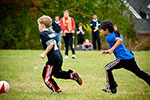 As children move toward adolescence, they rely increasingly on close relationships with peers. Socially withdrawn children, who have less contact with peers, may miss out on the support that friendships provide. In a new study about the peer relationships of almost 2,500 fifth graders who are socially withdrawn in different ways and those who are not withdrawn, researchers have found that withdrawn children who can be described as “anxious-solitary” differ considerably in their relationships with peers, compared to other withdrawn children and children who are not withdrawn.
As children move toward adolescence, they rely increasingly on close relationships with peers. Socially withdrawn children, who have less contact with peers, may miss out on the support that friendships provide. In a new study about the peer relationships of almost 2,500 fifth graders who are socially withdrawn in different ways and those who are not withdrawn, researchers have found that withdrawn children who can be described as “anxious-solitary” differ considerably in their relationships with peers, compared to other withdrawn children and children who are not withdrawn.
The study was conducted by researchers at Arizona State University as part of the Pathways Project, a larger longitudinal investigation of children’s social, psychological, and scholastic adjustment in school that is supported by the National Institutes of Health. It appears in the journal Child Development.
Socially withdrawn children who are classified as anxious-solitary are believed to experience competing motivations — they want to interact with peers, but the prospect of doing so causes anxiety that interferes with such interactions. In contrast, unsociable children are seen as having what’s called low approach and low avoidance motives—that is, they have little desire to interact with peers but are not repelled by the prospect of doing so; for these children, the overtures of peers do not make them feel anxious.
To learn more about students’ classroom behavior, emotions, and relations with peers, researchers collected students’ reports in which they nominated or rated their peers on a number of criteria (such as withdrawn behavior, aggressive behavior, prosocial behavior, and emotional sensitivity); teachers also reported on the same criteria. Reports were collected toward the beginning of the academic year and then again toward the end of the academic year. Using these reports, researchers classified students as anxious-solitary withdrawn, unsociable withdrawn, or non-withdrawn.
Compared with unsociable withdrawn youths and those who are not withdrawn, anxious-solitary children were found to be more emotionally sensitive and more likely to be excluded and victimized by their peers. They are also less likely to have friends, and when they do have friends, to have fewer than their peers and to lose friendships over time.
The researchers suggest that peer interaction is harder for anxious-solitary children because their anxiety interferes with their ability to form and maintain friendships. In contrast, unsociable youths tend to have more friends and to maintain those ties over time.
The study also found that having stable friendships protects children from being victimized by peers—and that both withdrawn and non-withdrawn children benefit from friendships in this way.
“Understanding withdrawn children’s friendships is important because they have fewer contacts with children their own age,” according to Gary Ladd, Cowden Distinguished Professor of Family and Human Development at Arizona State University, who led the study. “Because the consequences of peer isolation can be severe, it may be particularly important for withdrawn youth to develop and participate in friendships through organized sports, play dates, and other such activities.”
No comments yet.